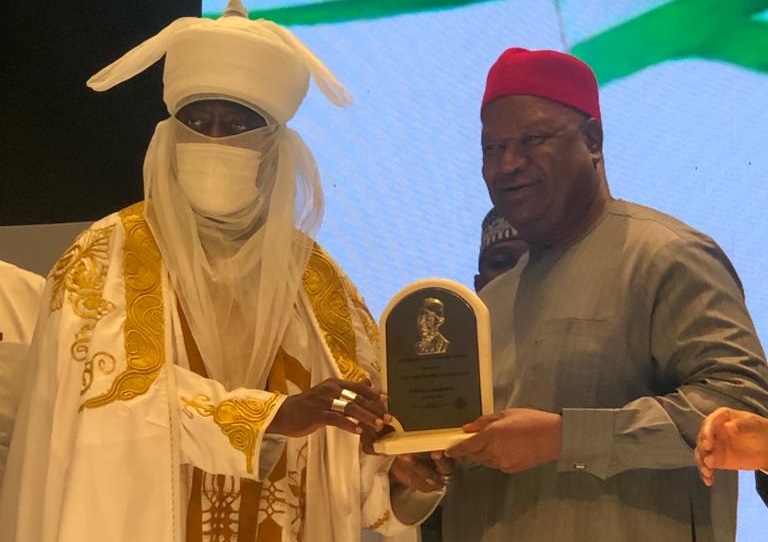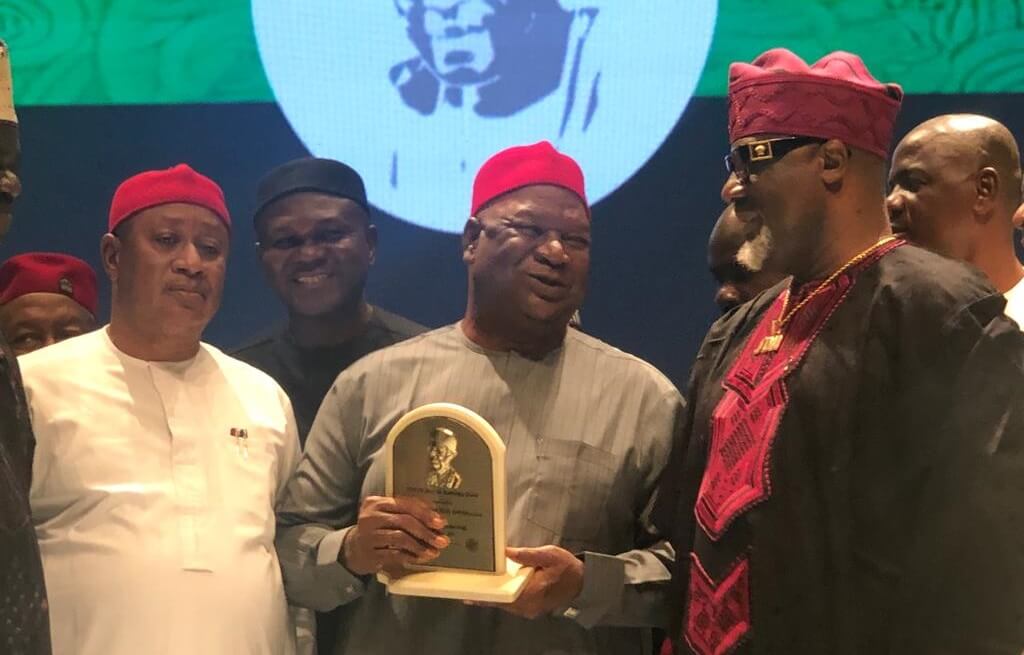At Zik Award, Anyim Lists Five Qualities Nigerian Leaders Must Have
Anyim Pius Anyim, former Senate President and ex-Secretary to the Government of the Federation, says Nigeria desperately needs leaders who can steer the ship of development and break the “cycles of stunted growth” which the country has found itself in.
According to Anyim, the country’s challenges are becoming more complex by the day and require “beyond the usual” leadership to tame them.
Advertisement
He regretted that a country that was acclaimed as “the giant of Africa” has been relegated to “the poverty capital of the world” due to ineffective leadership
The former SGF said for Nigerian leaders to address the country’s current and future challenges, they must be able to make sacrifices, be patient, tolerant, accommodating and be consensus builders.
Anyim stated this at the 2020 Zik Award held on Sunday at the Eko Hotels and Suites, Victoria Island Lagos, where he bagged the Zik Prize in Political Leadership.

Advertisement
The former Senate President and 2023 presidential aspirant said Nigerians were now more divided “than ever in our history” even though its forebearers founded it the principle of unity.
He said conferring on him the leadership award has rekindled his bid to offer himself for more service to the nation at a greater level.
“…I am pleased to lead the charge, so that, together with other good men and women we will lead and reunite Nigeria. We will heal our wounds and prosper our people in the years ahead”
In his acceptance speech, the former senate president said it is “a priceless honour” to be associated with the name “Zik” and called on Nigerian leaders to emulate the late Nnamdi Azikiwe, whom he said exemplified “principled, committed and focused leadership.”
“Zik was an outstanding and charismatic leader. A passionate patriot; an unapologetic nationalist; a relentless defender of justice and an ardent believer in the unity of Nigeria. These qualities stood Zik and his fellow nationalists out as leaders who rose to the challenges of their time, who fought with all they had, liberated us from the shackles of colonialism and laid a solid foundation for a nation with every potential to be a strong and respected voice among the comity of nations. Nigeria now, more than ever before, is in urgent need of men and women who will think, act and live like Zik and his fellow nationalists,” he said.
Advertisement
Anyim said the likes of Lagos State Governor Babajide Sanwo-Olu, NNPC’s Group Managing Director, Mele Kyari, and AfDB President, Akinwumi Adesina, amongst others who won awards in different categories, picked up the awards for the services they’re rendering in their respective domains.
The former SGF further warned of consequences of the impending 4th Industrial Revolution, noting that only visionary leaders can help the country fit into the shift.
The World Economic Forum had warned in 2016 that the revolution will “fundamentally alter the way we live, work, and relate to one another,” adding that “the transformation will be unlike anything humankind has experienced before.”
But Anyim believes that Nigeria can prepare against negative effects of the revolution if visionary leaders are elected to power.
According to him, the country needs more leaders with vision, capacity, and determination as it has been predicted that “leadership will be much more daunting as we move towards the 2nd quarter of the 21st Century (2026 – 2050) due to the effects of the 4th industrial revolution popularly known as Industry 4.0” and which has been described as “the next phase of dramatic technological expansion and social change”.
Anyim said some of the implications of the 4th Industrial Revolution for the future includes the following:
Advertisement
“1. As communication to millions of people across boundaries becomes common place, at little or no cost, every individual rich or poor, illiterate or educated would have the means to influence, challenge, stimulate or expose situations around them. Accordingly, civic engagement of the citizens would become inescapable for leaders in the 2nd quarter of the 21st Century.
“2. Scientists will continue to push the boundaries of technology in a bid to replace most human endeavour with machine operations, cutting across industries and human operations – (manufacturing, oil and gas, space travel, transportation, medicine, agriculture, sports, education, communication, construction, power supplies, military, banking etc). We are certain to experience unprecedented enhancement of the existing technologies, e.g., from electric vehicles to self-driving and self-assisted packing cars, from smartphones to smart homes, from cyberknife to robotics surgery, space travel to space colonization, from smart city to intelligent roads etc. The world no doubt will reach for an unprecedented level in technological expansion in the 2nd quarter of the 21st Century.
“3. In the next 25 years, oil companies and oil explorations will continue to phase out. This will certainly depress economies that are oil dependent with consequential social and economic effects.
“On the effect of the 4th Industrial revolution on our existence, again, Klaus Schwab captured it thus “we stand on the brink of a technological revolution that will fundamentally alter the way we live, work, and relate to one another. In its scale, scope, and complexity, the transformation will be unlike anything humankind has experienced before. We do not yet know just how it will unfold, but one thing is clear, the response to it must be integrated and comprehensive, involving all stakeholders of the global polity, from the public and private sectors to academia and civil society”. Ladies and gentlemen, in the years ahead, for Nigeria to survive and thrive, we must have peace at home and respect abroad. For that, we need leadership that understands the challenges, the imperatives and concomitant of the 4th Industrial Revolution. We need leaders that must connect and engage with the people especially the youth. Such leaders must place the youth at the center of every nation building effort in order to move them from the current valley of despair to the height of their potentials. We need leaders that can build societal consensus, repair our broken social fabrics and show deep empathy for all Nigerians that are suffering deprivation, poverty and want of any kind. Our leaders must be skilled in the science and art of good governance. They must be visionary and ready to keep pace with contemporary social, economic and technological changes. They must be pragmatic and result-driven in dealing with security, education, health and other myriad of challenges that confront our nation.”



